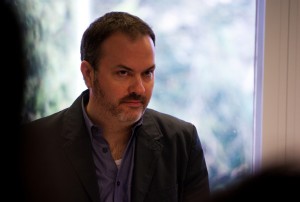
Week Two of the winter term kicked off with a discussion of the Forms of Love. To enhance our perspective on the topic, Craig Williams, who studied Classics at Yale University and is the author of Roman Homosexuality and Reading Roman Friendship (forthcoming), as well as various articles and reviews on Latin poetry and Roman culture, was the man chosen for the job. The agenda for the day was Eros and love in relation to friendship in poetry. Williams focused on the conjunction (whether copulative or comparative) of Eros and friendship, a tension that has never really been resolved in most languages.
‘Love and friendship’ has shaped a whole scholarly industry. In the tradition of friendship as a form of love, a sharp distinction has been drawn between love between friends and erotic love. We were asked to consider Eve Segwick’s term ‘homosocial,’ which ponders the idea of bonding between two similar individuals regardless of whether or not Eros is present. Segwick’s notion adds a nuance to the existing attempts to divide Eros and friendship.
Even so, it was impossible to implement this “neurosis” of separating the two in the Roman Age, since homosexuality was common. Amor (love) and Amicitia (friendship) found themselves constantly interwoven. Latin literary tradition allowed for a strong elevation of male-male relationships, depicted as the highest and most valued of loves. One of the most prominent Latin writers, Cicero wrote an essay on friendship in 44 BC where nobles gather and ask why two men are drawn together in friendship. The central speaker of this essay concluded that ‘the immortal gods have given humanity nothing better’ (than this bond), putting friendship before everything.
This connection between friends has even been linked to nature as in Manilius’ Astronomica, which seems to imply that the conjunction of the stars has led to people being bonded and this lends the relationship a higher importance. Others like Montaigne have even seen friends as each other’s alter egos, as one soul split into two bodies. This relationship, through time, was persistently cast in terms of the bond between two men.
A closer look at the assigned texts for the day led to a discussion of Catallus’ use of language, which produced warm evocations of the joys of friendship and how often the use of different words, no matter how close they sound, will take the reader into ambiguous realms where the lines between the erotic and the platonic blur.
The lecturer took us through the trials and tribulations of love and friendship and ended on a final contemplation of the application of the language of Eros to friendship and vice versa. Nevertheless, it can be said for sure, that Eros and friendship share a dialectical affiliation.
Unfortunately, the shortage of time designated to the lecture coupled with our unfamiliarity with the Latin tradition, failed to give us a deep enough understanding of the essence of the poetry. Regardless, the lecture was definitely a thought-provoking initiation into new territory. One must dare to hope that a deeper exploration of it will be part of our course of study this term.
